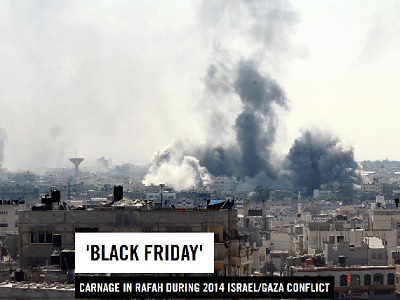
There is overwhelming evidence of war crimes commissioned and committed by the Israeli military in Rafah last August, a new report by Amnesty International has concluded.
In what the global human rights NGO has described as a “cutting edge investigation”, the Israeli army was found to have conducted “disproportionate, or otherwise indiscriminate, attacks which killed scores of civilians in their homes, on the streets and in vehicles and injured many more.”
Philip Luther, Director of the Middle East and North Africa Programme at Amnesty International, described a “relentless and massive bombardment of residential areas of Rafah”, carried out “without distinction between civilians and military targets.”
The events in Rafah, so-called ‘Black Friday’, have attracted attention for the army’s application of the controversial ‘Hannibal Protocol’, a secretive doctrine designed to thwart the capture of an Israeli soldier by the application of overwhelming force.
On August 1, 2014, the Israeli military implemented the Protocol in Rafah in the southern Gaza Strip when it was thought that Hamas fighters had captured a soldier, Hadar Goldin, alive. According to Amnesty, “the systematic and apparently deliberate nature of the air and ground attack on Rafah, which killed at least 135 civilians, may also amount to crimes against humanity.”
The online, interactive report, ‘Black Friday’: Carnage in Rafah during 2014 Israel/Gaza Conflict, is the result of a collaboration between Amnesty and Forensic Architecture, a research team based at Goldsmiths, University of London. The pair have previously worked together to map out Israel’s attacks on Gaza in a unique online tool unveiled earlier this month.
Experts analysed eyewitness testimonies, together with “hundreds of photos and videos taken from various sources and multiple locations, as well as new high resolution satellite imagery obtained by Amnesty International.” The “advanced techniques used to analyse evidence” included “studying shadows and smoke plumes in multiple videos to determine time and location of an attack.”
“The massive amount of evidence collected was presented to military and other experts, and then pieced together in chronological order to create a detailed account of events from 1 August, when the Israeli military implemented the controversial and secretive ‘Hannibal’ procedure following the capture of Lieutenant Hadar Goldin.”
The Amnesty report details “an intensive use of firepower” by the Israeli army, that lasted four days and killed “scores of civilians (reports range from at least 135 to over 200), injured many more and destroyed or damaged hundreds of homes and other civilian structures, mostly on 1 August.”
Amnesty cited evidence that Israeli forces “directly fired at and killed civilians, including people fleeing”, with eyewitnesses describing “horrifying scenes of chaos and panic as an inferno of fire from F-16 jets, drones, helicopters and artillery rained down on the streets.”
Evidence analysed by the researchers indicate that “hospitals and ambulances were attacked repeatedly during the assault on Rafah, in violation of international law.” These attacks included a drone-fired missile strike on an ambulance carrying a wounded old man, a woman and three children, “setting it alight and burning everyone inside including medical workers to death.”
With regards to the question of the Hannibal Protocol, the report notes that Israel’s attacks “may even have been intended to kill [Goldin]”, given the indiscriminate nature of the bombardment. Either way, according to Luther, “scores of Palestinian civilian lives were sacrificed” for the “single aim” of preventing “the capture alive of one soldier.”
In addition, Amnesty notes the “public statements by Israeli army commanders and soldiers after the conflict” that the organisations says “provide compelling reasons to conclude that some attacks that killed civilians and destroyed homes and property were intentionally carried out and motivated by a desire for revenge – to teach a lesson to, or punish, the population of Rafah.”
One of the most striking elements of Amnesty’s latest Gaza report is its commentary on the absence of a credible internal investigation procedure within the Israeli military. Amnesty notes that following Operation Protective Edge, military prosecutors have so far “indicted only three soldiers for one incident of looting.”
“Israeli army commanders and officers can operate in confidence that they are unlikely to be held accountable for violations of international law due to the pervasive climate of impunity that has existed for decades. This is due, in large part, to the lack of independent, impartial and effective investigations.”
Israeli authorities have “failed to conduct genuine, effective, and prompt investigations into any of the allegations of serious violations of international humanitarian law documented in this report, let alone to prosecute individuals, including commanders and civilian superiors, suspected of committing or ordering related crimes under international law.”
In what is perhaps the strongest worded indictment yet by a leading human rights NGO of Israel’s internal investigation mechanisms, including the role of the Military Advocate General, the report states that “Amnesty International’s view is that no official body capable of conducting such [credible] investigations currently exists in Israel.”
The clear implication, as the report itself states, is that the “the ongoing preliminary examination by the Prosecutor of the International Criminal Court into the situation in the Occupied Palestinian Territories” should receive the cooperation of the Israeli authorities, as should “any future investigations or prosecutions.”
(MiddleEastMonitor.com)




